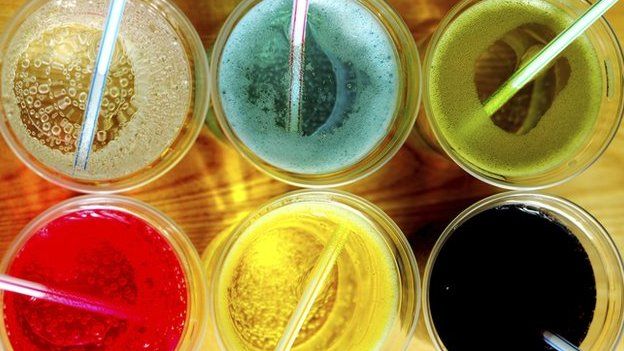Tesco to cut soft drinks sugar content
- Published
- comments

Campaign group Action on Sugar has welcomed Tesco's commitment to reduce added sugars by 5% per year in all their own-label soft drinks.
This means that after four years, about two teaspoons of sugar will have been removed from a can of fizzy drink.
A gradual reduction in calories and sweetness in drinks is the best way to cut sugar intake in the UK population, the group says.
Public Health England said other drinks brands should now follow Tesco's lead.
But the British Soft Drinks Association maintains that a number of companies have been reducing calories in their soft drinks for some time.
Recent figures show that over the last three years, calories in soft drinks are down by 7.3% and sugar is down by 8.3%.
Yet some sugary drinks still contain as much as 11 teaspoons of sugar in one 330ml can.
In a can of Tesco's classic cola there are nine teaspoons of sugar and in Tesco's fiery ginger beer there are 11 teaspoons of sugar.
Pepsi and Coca-Cola cans also contain nine teaspoons of sugar.
How much sugar is in your drink?
Old Jamaica Ginger Beer - 50.2g or 13 teaspoons
Fentimans Traditional Rose Lemonade - 38.6g or 10 teaspoons
7Up - 36.3g or 9 teaspoons
Tesco classic cola - 36g or 9 teaspoons
Coca-Cola - 35g or 9 teaspoons
Pepsi - 35g or 9 teaspoons
Barr's Irn Bru - 34g or 8 teaspoons
Tesco original cola - 32g or 8 teaspoons
Fanta Orange - 22.8g or 6 teaspoons
Source: Action on Sugar
Incremental reduction
With a 5% reduction every year over four years, Tesco's actions could result in 21kcal being removed from the average daily diet - or 477 billion calories from the total UK diet.
At present, the guideline daily amount of sugar intake is 90g in the UK - but the target is 25g for women (five to six teaspoons) and 35g (seven to eight teaspoons) for men, based on the average diet.
Prof Graham MacGregor, chairman of Action on Sugar, and professor of cardiovascular medicine at Queen Mary University London, says the supermarket chain's decision to commit to an incremental reduction in added sugars is really important.
"Merely having the option of diet or no-sugar products does not work, particularly for the most socially deprived.
"This is the way to do it. Now the pressure will be on other supermarkets and other brands to follow suit," he said.
He said gradually reducing calories in all sweetened drinks would help to reduce levels of type 2 diabetes and cut obesity in the UK population.
A similar strategy for the incremental reduction of salt content in food led to a 15% fall in salt intakes in the UK and fewer deaths from strokes and heart attacks, Prof MacGregor added.
'Too much sugar'
Dr Alison Tedstone, chief nutritionist at Public Health England, said "reformulation" of food and drink products is a highly effective way of helping people to reduce sugar in their diet.
"We urge other drinks brands and supermarkets to follow in Tesco's footsteps.
"As a nation we are eating too much sugar which leads to weight gain and obesity, increasing our risk of life-threatening illnesses such as type 2 diabetes and heart disease."
PHE said the Scientific Advisory Committee on Nutrition (SACN) was currently finalising its recommendations on sugar and would publish them later in the year.
Gavin Partington, director general of the British Soft Drinks Association, says diet drinks now make up 60% of the soft drinks market.
He added that other supermarkets had also been getting in on the act of reducing sugar content.
Sainsbury's has reduced the sugar content of its own-brand high juice squashes by between 4% and 10%, the Co-Operative Group has removed 1.5 billion calories from its range of own-branded squashes and ASDA is set to reduce added sugar by 22% across a range of its own-brand soft drinks.
- Published22 March 2013
- Published26 February 2015
- Published22 March 2013
- Published19 March 2015